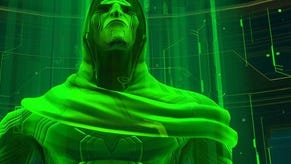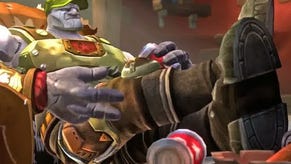WildStar picks subs, but you can trade gold for game time
Carbine sticks up for an unfashionable MMO business model.
WildStar, the sci-fi online world due for release in spring 2014, will fly in the face of massively multiplayer fashion by charging a subscription, developer Carbine has announced. But there's a twist: you'll also be able play for free by trading in-game currency for game time with other players.
The system, called CREDD, is similar to the PLEX system introduced to Eve Online's economy a couple of years ago. It effectively enables authorised gold buying for one segment of WildStar players and free gameplay for another. Cash-rich and time-poor players will buy CREDD as an in-game item direct from Carbine, and then sell it for gold over WildStar's trading system to their time-rich and cash-poor cohorts.
CREDD (which stands for Certificate of Research, Exploration, Destruction and Development) will be priced higher in real money than a standard sub, to protect the system from exploitation, but its price in game gold will be subject to the market forces of WildStar's economy. You'll only be able to trade it through the game's Commodities Exchange, an automated 'blind' auction house where you can only buy commodities at the lowest available price with no awareness of the seller's identity. CREDD can't be gifted.
Everything else about the way WildStar will be sold is true to the formula established for MMOs in the late 1990s and popularised - somewhat fatally for its competitors - by World of Warcraft. The game will be sold digitally and in boxes for £35/€45/$60. It will include 30 days of game time and three one-week guest passes for friends. After your 30 days, you'll need to pay a subscription (or buy game time cards) at the rate of £9/€13/$15 per month, with better deals available if you buy in three, six or 12-month blocks. CREDD will cost £12/€17/$20.
The announcement is surprising because for some years now, the writing has appeared to be on the wall for subscription-funded MMOs. You can count the successful examples still in operation on the fingers of one hand, very few recent launches among them. Meanwhile, many games - including BioWare's high-profile Star Wars: The Old Republic - have rushed through new business models as they try to stave off competition from the rising tide of free-to-play online gaming and abandon their assaults on WOW's dominance. The results have been mixed.
What makes Carbine think WildStar will be any different? I put the question to Jeremy Gaffney, executive producer, when he spoke to me on the phone from the studio's California base last week.
"CREDD is part of our answer to that," Gaffney said. "What we're doing is launching having designed for the ability to either pay a subscription or earn CREDD in the game if you don't want to... We've let player A play for free without a subscription. He's stoked, he's a happy unit. He's traded in some of his time for the ability play for free. Player B, who sold him the CREDD, is stoked because they basically went and bought an item for money, it was a secure transaction, they're not getting hacked or scammed or anything, and they traded that to another player for in-game gold pieces. It's kind of win-win. That's the answer for me - keeping the player types happy."
It's true that CREDD is an exceptionally elegant solution to two problems facing online worlds: how to enable free play in a game designed around the idea of a subscription, and how to combat gold trading and all its associated problems (farming of resources, account hacking, credit card scamming and so on. "Anything we can do to clean that up, we like doing," Gaffney said). By trading the desires of two segments of players off against each other, it potentially resolves both. PLEX is a proven success in Eve Online, where many players use it to fund secondary accounts.

"We looked around at a number of systems," Gaffney said. "Each system you look at, there's one or two generally strong contenders using that system well, and it tends to be the strongest game in the category. So we looked at PLEX; Tera did Chronoscrolls, which was another variant on the system. We have our own variant on it... We're a very different game than Eve, obviously. And that's a good thing. But I have a ton of respect for Eve, it's one of the games that's just quietly been sitting there making money for a decade now, when so many other games have come and gone."
By offering an alternative to a subscription, perhaps CREDD will help WildStar stave off the switch to free-to-play which has seemed inevitable in so many recent MMO launches. But the question remains: why go for a subscription in the first place?
Gaffney is pragmatic: for him, it's about knowing exactly how much Carbine can invest in the infrastructure and ongoing development of the game. "To us as developers, a subscription model is great because you know, per player, how much money you're making. If you are in a very variable system like a pure free-to-play, then... you don't know.
"The benefits for the user are pretty clear. If we're running our business right and we're re investing heavily into what the game is, then every player is having a significant impact - hey, we're going to make the content, we're going to make the updates and the patches that it needs to retain players in the long haul. You're not having to pay all the costs for players who are not paying a dime into the system. So they're getting a better return on their money, because it goes into the updates. But that requires some trust," he admitted.
Gaffney also argued that subscriptions aren't just economically simpler for a developer to run - they're ethically simpler, too. "It's very hard to ethically run your game [as free-to-play]," he said. "You know, every time you figure something new that makes you more money, are you gouging money out of your users and pissing them off in a way that you're really going to pay for in a long time? Or have you tapped into a new user need? It's very hard to do right. Players don't care if it's hard for us, they care about what they want in a game. But it's very difficult."
Gaffney isn't opposed to free-to-play in principle, and cited League of Legends as an example of a game that integrates its business model well with the game design. However you're asking players to pay, though, his belief is that it's important to commit to it.
"Good games make money, regardless of business model. It's important to embrace one, and it's important to support it well and deeply." - Jeremy Gaffney
"I think that it's more important to embrace your model well than it is to be swayed by the whims... because it seems like, hey, these three games are making more money. I think good games make money, regardless of business model," he said firmly. "I think it's important to embrace one, and it's important to support it well and deeply.
"I think almost everything in MMOs needs to be planned well because the games are so large, and there's so much content. The design intricacies are so tough, because you can goof up itemisation at level 40 in one spot in your game and it could dominate your entire economy of items for years to come. I can name cases exactly like that in... well, pick a big MMO. Because of that, planning planning planning is kind of key. I think that's also why few games have successfully made the leap between business models."
World of Warcraft subscriptions have have recently slumped to 2007 levels, although that still constitutes an impressive 7.7 million paying customers for its developer Blizzard. As the game ages, the opportunities for rivals surely increase - though many, BioWare included, have come a cropper on that particular bit of reasoning. I asked Gaffney if he thought WOW's fading was a good sign or a bad one for a rival subscription game like his.
"I'm not sure that it's either," he said, diplomatically. "I think strong games strengthen the market... The Blizzard guys are smart as hell. If their numbers are declining, then I'm sure that they're fanatically working to get that turned around and I'm sure they'll have some cool stuff in the hopper to do that with. And will they succeed? They're a strong developer, I don't count them out at all.
"The plus side of course is that the more people who have had a positive experience with an MMO and left it, the more are now looking for their next MMO. That's a win for new games entering the market. But guess what, fast forward two years later and now you're on the other end of that equation."
Gaffney sounded realistic and even-handed throughout our chat. His arguments in favour of subscriptions made sense. But the truth remains that if WildStar makes a success of itself as a subscription game in 2014, it will be an anomaly, so the risk for Carbine and its publisher NCsoft seems like a big one.
Then again, traditional MMOs that have made free-to-play work for them are equally scarce, and Gaffney is absolutely right that the strongest games in every category have been tailored to their business model from the start - and, more to the point, they've been good. WildStar's quality is yet to be proven, and a continuing appetite among players for traditional MMOs that aren't WOW is, perhaps, in doubt. With CREDD, at least, Carbine has picked a simple yet sophisticated twist that will give WildStar its best shot at making subscriptions work again.











